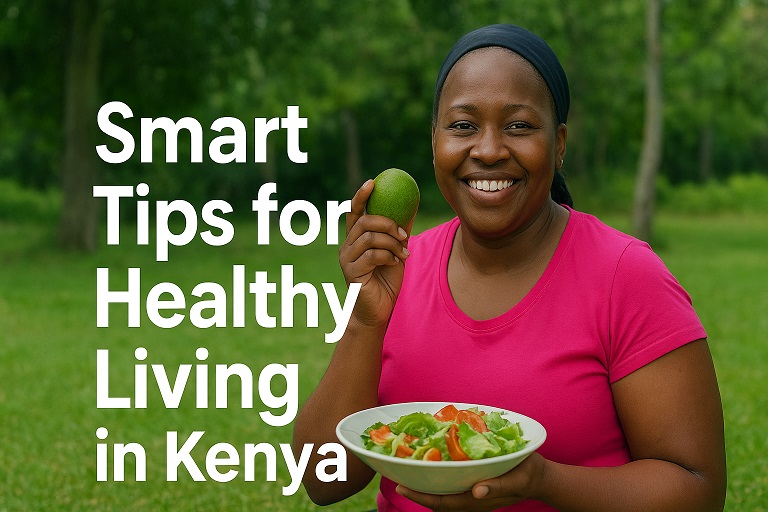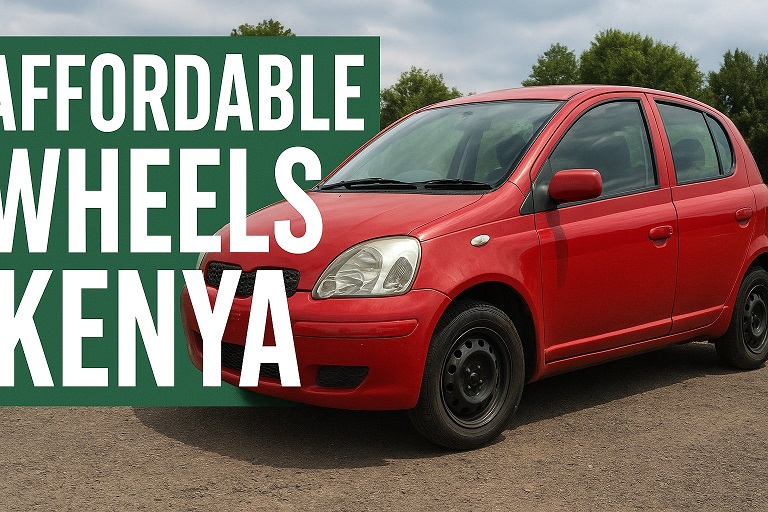

Titus Morebu
Author
Recommended Health & Wellness Tips for Kenyans
Live healthier through balanced diet, fitness, mental care & preventive habits — designed for life in Kenya 🌿
Thrive in Kenya: Smart Tips for Healthy Living 🇰🇪
Living well in Kenya isn’t just about mimicking global trends — it’s adapting them to our landscapes, rhythms, food culture, climate, and public health priorities. Below you’ll find holistic, up-to-date, practical strategies you can apply whether you’re in Nairobi, Kisumu, Nakuru, or a rural county. Let’s elevate how Kenyans live, one daily habit at a time.
1. Nourish Body & Mind through a Balanced Diet
Kenya’s national dietary guidelines stress variety, moderation, and local foods. Incorporate these principles into your meals:
- **Eat a diversity of foods daily.** Include whole grains (like millet, sorghum, unprocessed maize), tubers, and healthy staples.
- **Prioritize vegetables & fruits.** Aim for green leafy vegetables, red and yellow produce every day.
- **Beans, legumes & nuts** should be regular — at least 3–4 times per week.
- **Moderate animal products.** Lean meat, fish, eggs, and dairy are helpful, but don’t overdo them.
- **Limit added sugar, salt & saturated fats.** Use iodised salt sparingly. Sweetened drinks and ultra-processed snacks drive noncommunicable diseases.
- **Stay hydrated with safe water.** Avoid excessive sugary or carbonated drinks.
In recent years, Kenyan authorities have proposed nutrient-profile based warning labels for packaged foods with excessive sugar, salt, or fat — showing how urgently we need to shift toward cleaner eating. (This highlights how common processed foods may not be as harmless as they seem.)
2. Move Intentionally — Physical Activity for Daily Life
Exercise doesn’t require a gym membership. The goal is consistency, variety, and sustainability.
- **Target ~150 minutes/week** of moderate activity (brisk walking, cycling) or 75 minutes of vigorous activity (running, fast dancing).
- **Break long sedentary periods.** If you sit at work, stand and stretch every 30–60 minutes.
- **Use active transport.** Walk or cycle when possible instead of always relying on vehicles.
- **Social & group exercise.** Join a community walk, sports club, or dance group to keep you motivated.
- **Strength & flexibility.** Bodyweight exercises (pushups, squats), yoga or stretching help injury prevention and mobility.
- **Kids & youth: 60 min/day.** Children aged 5–17 should aim for ≥ 60 minutes of moderate-to-vigorous activity daily.
3. Prioritize Sleep & Recovery
Many Kenyans juggle multiple jobs, traffic, and family responsibilities — but neglecting rest erodes health.
- **Aim for 7–9 hours nightly.** Consistency matters — try to sleep and wake at fixed times.
- **Wind down early.** Switch off screens 30 minutes before bedtime; limit caffeine in the evening.
- **Nap smartly.** Short power naps (20 minutes) help, but avoid long daytime naps that disrupt nocturnal sleep.
- **Ensure quality.** Keep your sleeping environment cool, quiet, and dark. Prioritize comfort and good mattress/pillow support.
4. Mental Well-Being & Stress Resilience
Emotional health is integral to a thriving life — not a “luxury.” In Kenya’s fast-paced context, stress, burnout, and mental health challenges are real.
- **Daily mental breaks.** Even 5–10 minutes of deep breathing, mindfulness, or journaling can reset your mind.
- **Stay socially connected.** Spend time with supportive family or friends; join community groups or clubs.
- **Set boundaries.** Define work hours; avoid always being “on call.”
- **Digital detox.** Carve out time away from social media or screens to reconnect with nature or offline life.
- **Seek help when needed.** Talking to a trusted person, counselor, or mental health service is a sign of strength — not weakness.
5. Preventive Health & Regular Check-Ups
Catch disease early when it’s most manageable. Malays key “health numbers” you should monitor regularly:
| Metric | Recommended Action |
|---|---|
| Blood pressure | Check at least annually (or more if borderline / family history) |
| Blood sugar / HbA1c | Especially if overweight, family history, or in midlife |
| Cholesterol / lipids | Monitor every few years above age 30 or risk factors present |
| Weight / BMI / waist circumference | Track trends — aim for healthy range, avoid central obesity |
Use credible health systems — county hospitals, government clinics, labs — to obtain regular screenings. Early detection saves lives.
6. Smart Habits & Behavior Tweaks That Add Up
Small habits compound to major wins. Try these in your daily life:
- **Meal prep & planning.** Cook in bulk and carry healthy snacks to avoid impulsive buys of junk food.
- **Mindful eating.** Slow down, chew well, eat when hungry instead of emotionally or out of boredom.
- **Limit sugary drinks.** Replace sodas and sweet tea with infused water or natural alternatives.
- **Quit or avoid tobacco and limit alcohol.** These are major risk factors for many diseases.
- **Sun protection.** Use sunscreen, wear hats, and avoid sun exposure during peak hours to prevent skin damage.
- **Good posture & ergonomics.** In offices or while driving, support your back, use proper seating, avoid slouching.
7. Tailoring Health to Kenya’s Context & Challenges
Some key local considerations worth noting:
- **Climate & heat stress.** In hot regions, stay hydrated, avoid midday outdoor strain, wear breathable clothing.
- **Food safety & water quality.** Drink safe, treated water. Wash produce thoroughly. Cook foods to safe internal temperatures.
- **Malaria & vector protection.** In endemic areas, use bed nets, insect repellent, and reduce mosquito breeding sites.
- **Community health initiatives.** Kenya’s Community Health Strategy (2020–2025) aims to strengthen health at household levels — engage local community health workers when available.
Putting It All Together — A Daily Routine Sketch
Here’s how a balanced Kenyan day might look when weaving in healthy habits:
- Wake up, drink water, do 5 minutes of stretching or gratitude journaling.
- Breakfast: whole grain porridge, a handful of nuts, seasonal fruit, and milk or plant-based alternative.
- Commute with a walk or active transport if possible.
- Mid-morning healthy snack: fruit, roasted beans, or unsalted nuts.
- Lunch: a plate with whole grain staple, vegetables, and lean protein (beans, fish, chicken) with minimal oil.
- Afternoon break: short walk, deep breaths, or movement break.
- Evening: light to moderate exercise (walk, dance, bodyweight workout).
- Dinner: lighter meal, avoid heavy late meals if possible.
- Wind-down routine: reduce screens, relax, and aim for 7–9 hours of sleep.
Conclusion: Sustainable Health, Kenyan Style
Healthy living is not about rigid rules — it's about creating a system that works for your life, environment, and goals. As a Kenyan, lean into local foods, climate wisdom, community, and resilience. Over time, consistent small changes compound into vitality, longevity, and joy.
Take one tip, try it for 30 days, and build momentum. Your body, mind, and community will thank you. 💚
“Health is wealth not just in your wallet, but in your body, mind, and every tomorrow.”
Learn more about Kenya’s national dietary guidelines and the country’s community health strategy 2020–2025.
Gallery

Related Articles
3 articles
Best Gyms in Nairobi & Their Membership Costs (2025 Guide)
Explore top gyms across Nairobi—facilities, membership fees, day passes, & tips for choosing your fit. 💪

How to Import a Car into Kenya: The Ultimate 2025 Guide 🚗
Learn the full step-by-step process, rules, costs, and tips to import a motor vehicle into Kenya—touring duty, age limits, clearance, registration.

Affordable Wheels Kenya: Top Low-Cost Cars to Consider
Explore the most budget-friendly cars in Kenya — with tips, real prices, and what to watch out for when buying cheap wheels in 2025 🇰🇪